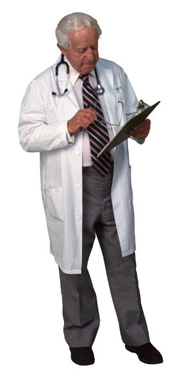Prostate CancerCancer that forms in tissues of the prostate (a gland in the male reproductive system found below the bladder and in front of the rectum). Prostate cancer usually occurs in older men. Some experts believe that EVERY man will develop some degree of prostate cancer if he lives long enough. Autopsy studies have shown microscopic evidence of prostate cancer in 15-30% of men over the age of 50 and in 60-70% of men who reach age 80. But don't let that statistic scare you. The reality is that fewer men are dying from prostate cancer than ever before. |
|
Each year, more than 186,000 American men learn they have this disease.
Prostate cancer is the second most common type of cancer among men in this country. Only skin cancer is more common.
Prostate cancer will affect an estimated 1 in 6 American men over their lifetime. Currently, evidence exists to support the hypothesis that approximately 5% to 10% of all prostate cancer is due to rare autosomal dominant prostate cancer susceptibility genes. The proportion of prostate cancer associated with an inherited susceptibility may be even larger. Men are generally considered to be candidates for genetic counseling regarding prostate cancer risk if they have a family history of prostate cancer. The Hopkins Criteria provide a working definition of hereditary prostate cancer families. The three criteria include:
Three or more first-degree relatives (father, brother, son),
Three successive generations of either the maternal or paternal lineages, and/or
At least two relatives affected at age 55 years. or younger.
Families need to fulfill only one of these criteria to be considered to have hereditary prostate cancer. One study investigated attitudes regarding prostate cancer susceptibility among sons of men with prostate cancer.They found that 90% of sons were interested in knowing if there is an inherited susceptibility to prostate cancer and would be likely to undergo screening as well as consider genetic testing if there was a family history of prostate cancer; however, similar high levels of interest in genetic testing for other hereditary cancer syndromes have not generally been borne out in testing uptake once the clinical genetic test becomes available.
Prostate Cancer Surgery Videos Radical Prostatectomy | |||
| Retropubic | Perineal | Laparoscopic | Robotic Laparoscopic |
Prostate Cancer - Watchful Waiting
Watchful waiting is often called "active surveillance" or "observation" and means that you decide to have no active treatment now. Your doctor will want to follow you closely to look for any signs that the disease may be changing. You will have tests like the ones you've already had such as digital rectal exams, PSA tests, and repeat biopsies. You can change your mind and decide to have treatment at any time. Watchful waiting is based on the fact that many early-stage prostate cancers grow so slowly that they may never cause problems or become life threatening. In some cases, it may be a way to avoid the harms of treatment without shortening life expectancy. Or it can be a decision based on your age and other serious health problems - older men in their 70s and 80s may not have the same views about undergoing surgery or radiation therapy as younger men.
Video series --- One patient's video journey from deciding on prostate cancer surgery, the robotic prostatectomy, more accurately a robot-assisted, minimally invasive surgery and recovery from surgery. |







